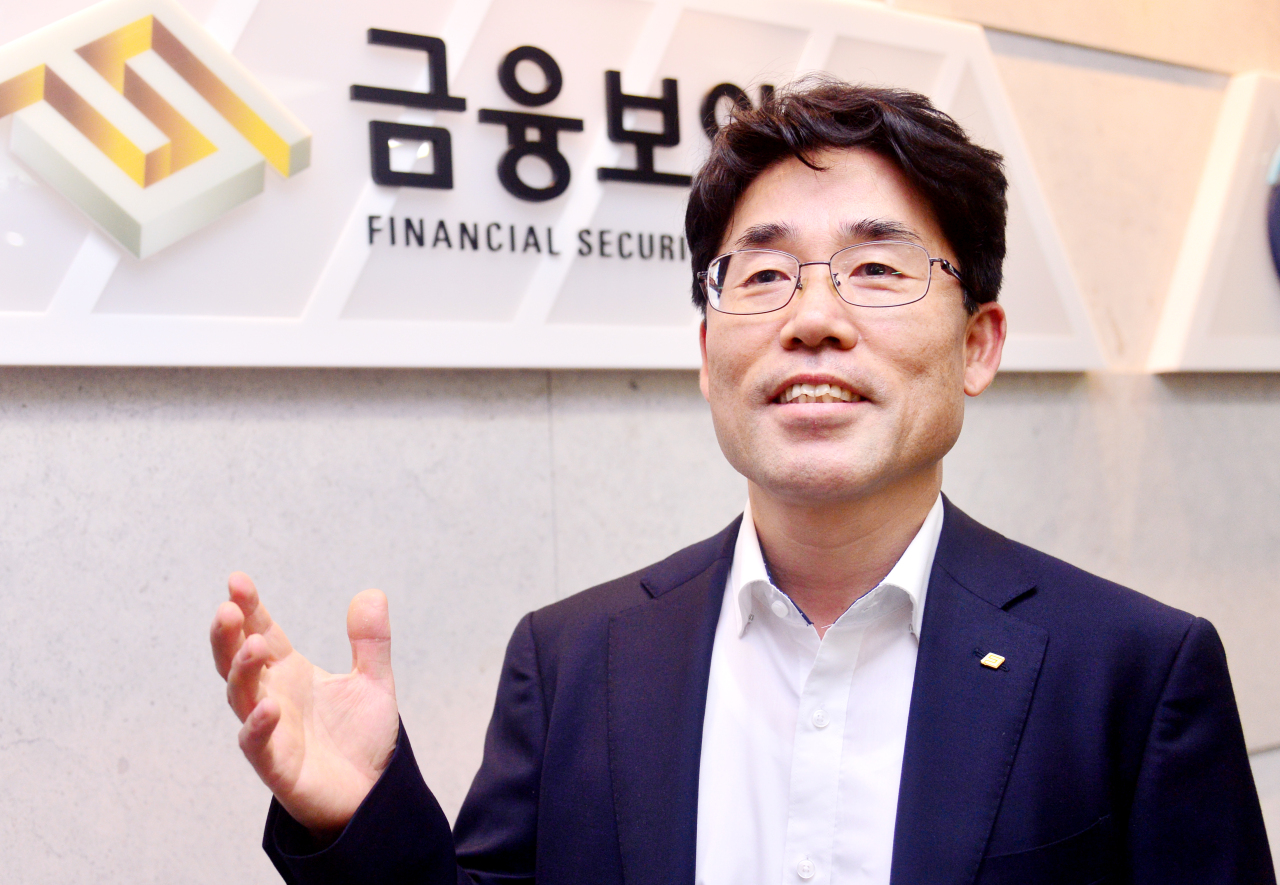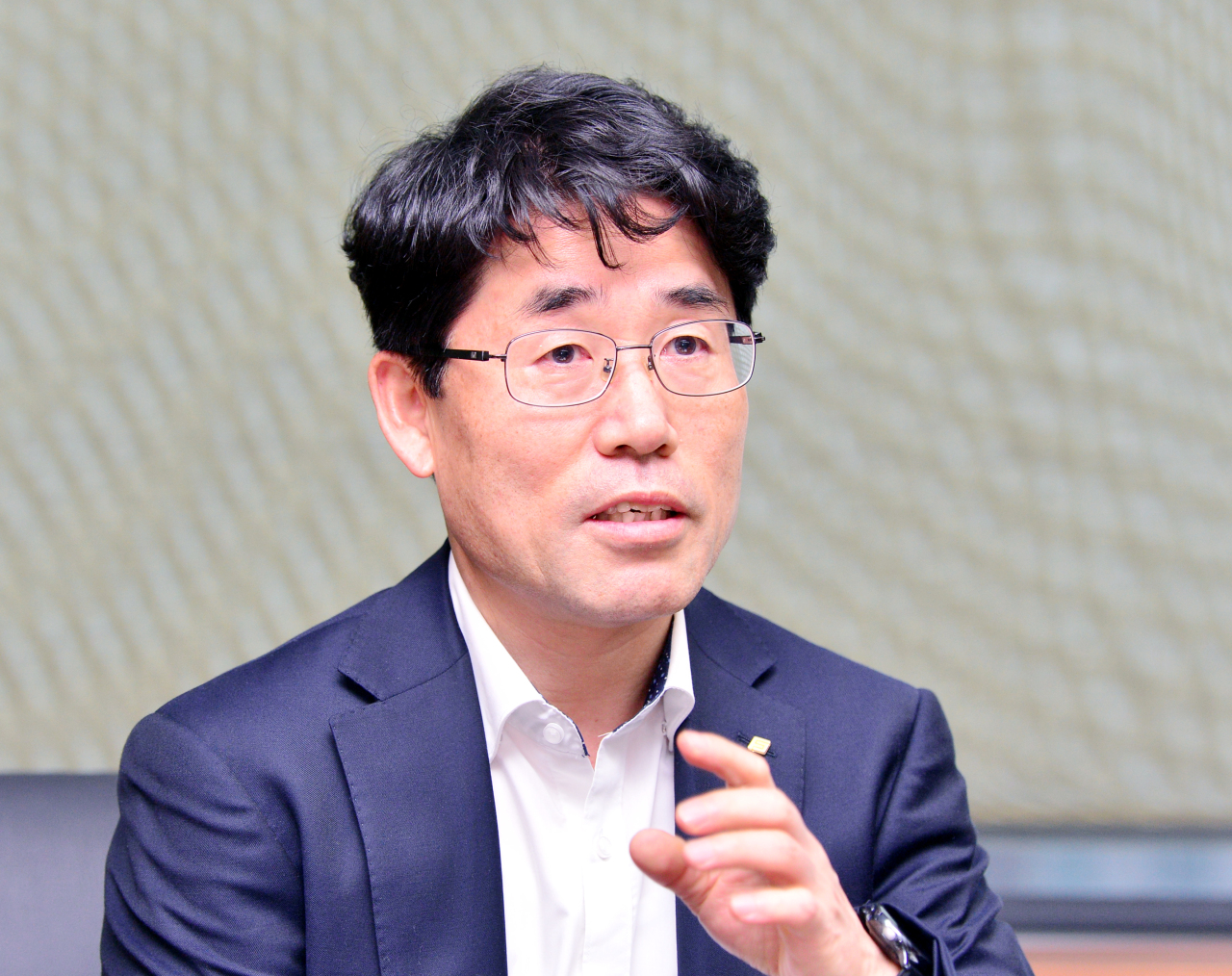 |
Financial Security Institute President Kim Young-gi speaks at an interview with The Korea Herald in Yeouido, Seoul, last week. (Park Hyun-koo/The Korea Herald) |
South Korea is making all-out efforts to accelerate digital transformation in the financial sector, having launched a data exchange platform last month for convenient transactions.
From credit card transaction histories, spending trends in online shopping malls to transport payments, data processed for marketing and research purposes is now being traded without having to worry about security breaches, on FinDX.
FinDX is Korea’s first financial data exchange platform operated by the state-run Financial Security Institute, an independent agency tasked with bolstering information management and protection capabilities in the financial sector.
In its first month alone, a total of 136 data sets, worth some 300 million won ($250,000), were traded on the platform. It also holds more than 300 data sets listed for trade, but the volume of data exchange is expected to grow, exponentially, said the head of FSI in an interview with The Korea Herald, stressing that data analysis is key to digital transformation of all industries.
Pointing to the “untact” (non-face-to-face contact) trend triggered by the COVID-19 pandemic -- 91.2 percent of transactions have been online or via mobile this year -- FSI President Kim Young-gi said South Korea is making bold strides toward data-driven economy. And FinDX is a starting point, facilitating such a grand change.
“Korea will turn into a ‘data-driven economy’ in the post coronavirus context -- (a new market environment) where companies that excel in data collection as well as in data analysis win over competitors, and become powerful enough to dominate the market,” Kim said, underlining that state-led projects to nurture the data industry were crucial to ensure this industrial shift in Korea, which still relies on manufacturing for growth.
Manufacturing industries account for nearly 30 percent of South Korea’s gross domestic product, far higher than the global average of 15 percent, according to the Finance Ministry.
“The nation’s rapid economic growth over the past 30 years was led by manufacturing industries such as shipbuilding and chemicals, but they have been losing luster in recent years,” he said.
“By taking advantage of its tech prowess, the country should pour all-out efforts to support the digital sector backed by data collection including non-contact industries, artificial intelligence as well as big data services so that the local economy can see stable economic growth amid systemic changes in the ‘fourth industrial revolution.’”
Financial data acts as a catalyst for digital acceleration as it creates unprecedented business opportunities, he said.
When combined with demographic data produced in other industries such as retail, telecommunications and health care, financial data helps industry leaders to make collaborate with other industry players. Insurance companies, for example, can diversify their health coverage plans by analyzing medical histories collected from health care institutions, he explained.
“To operate digital financial platforms including online and mobile applications for money transfer or investments, there is a great need to launch personalized services that satisfy customers’ diverse interests. It includes financial data, ranging from transaction details to credit scores, by which companies can develop competitive digital items.”
 |
Financial Security Institute President Kim Young-gi speaks at an interview with The Korea Herald in Yeouido, Seoul, last week. (Park Hyun-koo/The Korea Herald) |
Pandemic and data industry
The lingering pandemic has changed the way how people perceive the disclosure and use of private financial records.
Despite existing debate on privacy, the government’s access to individuals’ credit card records to trace the movements of virus-positive patients have somewhat changed the public perception toward private data use, Kim said, adding that people have become less hostile.
In a recent survey jointly conducted by the Korean Chamber of Commerce and Industry and Korea Internet Corporations Association, 77 percent of the respondents said they are willing to give out personal data to the government or local markets for policymaking or commercial purposes.
Along with changes in public perceptions, the new legal ground for data exchange is set to accelerate the use of data in industries.
Taking effect in August, the use of personal information offered under aliases will be allowed, without people’s consent, for compiling statistics and industrial research.
South Korea, however, is a late starter in terms of data trading.
In 2014, China launched the world’s first global big data exchange platform, inviting IT giants Alibaba and Tencent for vibrant financial data trade. As of 2019, the platform traded data worth a combined 70 billion won for five years. The US is the world’s largest data market with an estimated value of over $15.2 billion, according to onAudience.com, a London-based big data company, in a report.
When asked about the impact of data transactions on the domestic economy, Kim cited statistics from the Ministry of Employment and Labor, saying at least nearly 80,000 of new jobs will be created over five years on a condition that the percentage of local firms deploying big data will climb to 10 percent.
Stressing the importance of data security -- the protection of one’s data against unauthorized access or outside attacks -- Kim said the data-driven industry should be innovative but responsible.
"What drives the country’s data economy is consumer trust derived from data safety. This is why not about other government agencies, but the FSI was selected as the operator of a data exchange platform,” he said. The FSI will carefully monitor whether the data is being traded under aliases or anonymously and also provide special services such as data analyses to sellers, for financial institutions reluctant to upload raw data in fear of information leaks, he said.
The FSI was established in April 2015 as an incorporated association for the purpose of strengthening security in the financial industry and developing related policies with the government officials, backed by Korea Financial Telecommunications and Clearings Institute as well as Koscom.
Kim, former senior deputy governor of the Financial Supervisory Services’ bank supervision unit, was appointed as the third president of the FSI in April 2018.
By Choi Jae-hee (
cjh@heraldcorp.com)








![[Today’s K-pop] Blackpink’s Jennie, Lisa invited to Coachella as solo acts](http://res.heraldm.com/phpwas/restmb_idxmake.php?idx=644&simg=/content/image/2024/11/21/20241121050099_0.jpg)
